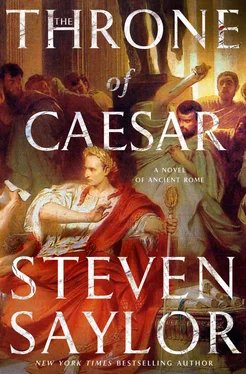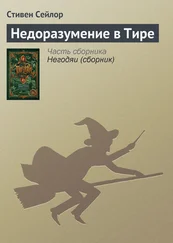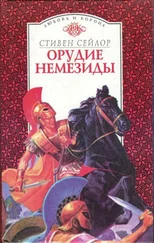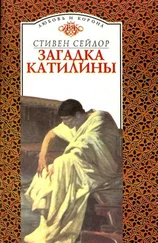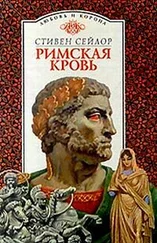Стивен Сейлор - The Throne of Caesar
Здесь есть возможность читать онлайн «Стивен Сейлор - The Throne of Caesar» весь текст электронной книги совершенно бесплатно (целиком полную версию без сокращений). В некоторых случаях можно слушать аудио, скачать через торрент в формате fb2 и присутствует краткое содержание. Год выпуска: 2018, Издательство: St. Martin's Press, Жанр: Исторический детектив, на английском языке. Описание произведения, (предисловие) а так же отзывы посетителей доступны на портале библиотеки ЛибКат.
- Название:The Throne of Caesar
- Автор:
- Издательство:St. Martin's Press
- Жанр:
- Год:2018
- ISBN:нет данных
- Рейтинг книги:5 / 5. Голосов: 1
-
Избранное:Добавить в избранное
- Отзывы:
-
Ваша оценка:
- 100
- 1
- 2
- 3
- 4
- 5
The Throne of Caesar: краткое содержание, описание и аннотация
Предлагаем к чтению аннотацию, описание, краткое содержание или предисловие (зависит от того, что написал сам автор книги «The Throne of Caesar»). Если вы не нашли необходимую информацию о книге — напишите в комментариях, мы постараемся отыскать её.
The Throne of Caesar — читать онлайн бесплатно полную книгу (весь текст) целиком
Ниже представлен текст книги, разбитый по страницам. Система сохранения места последней прочитанной страницы, позволяет с удобством читать онлайн бесплатно книгу «The Throne of Caesar», без необходимости каждый раз заново искать на чём Вы остановились. Поставьте закладку, и сможете в любой момент перейти на страницу, на которой закончили чтение.
Интервал:
Закладка:
In a matter of seconds, while I watched dumbstruck, the world’s only copy of the Orpheus and Pentheus was reduced to ashes.
XLVIII
“Incinerated before our eyes—the work that Caesar called the greatest poem in the Latin language!”
“That’s not exactly what Caesar said, Papa.”
“Well, he said something close to that.”
After the funeral, Meto had come home with Bethesda and Diana and me. The women had retired to their rooms. My son and I sat in the garden.
“What exactly did Antony tell you, Papa, as we were leaving the funeral?”
“I asked what document had been burned along with the Zmyrna, and he said, ‘The other poem. The last one. Orpheus and Pentheus. ’”
“And you asked him if it was the only copy?”
“Of course I did.” The circumstances had been quite awkward. After the items on the pyre were consumed, and priests recited the usual prayers, the ashes were gathered and placed in a bronze urn, which was presented to Sappho. She held it as one might hold a serpent, at arm’s length. In that urn, symbolically, was all that remained of her father—the tunic stained with his blood, the Zmyrna, and the Orpheus and Pentheus —never to be read or recited to another mortal .
“But why did Antony allow the Nubian nursemaid to burn it?”
“He said it was Sappho’s wish. It was his judgment, as executor of Cinna’s will, that Sappho had the right to do as she wished with her inheritance.”
“But Antony is also the girl’s guardian now,” said Meto. “In the absence of a father or brother or husband, he’s legally responsible for her. Sappho can’t act on her own, not in a matter of such importance. She has to obey his directives. Isn’t that the law?”
“You’re right—up to a point. Women have no standing and no rights under Roman law. All legal issues concerning a woman are to be decided by the man responsible for her—in this case, now that Cinna is dead, and by Cinna’s will, Antony. But the burning of a poem breaks no law that I know of.”
“Antony still could have stopped her, and he should have!” said Meto. “If not Antony, then Fulvia. She seems to have a great deal of influence over the girl.”
I shook my head. “I can hardly believe it myself. Caesar was the only man ever to read the poem from start to finish. And only a handful of us heard Cinna recite it. How long ago that night seems now.…”
“Sappho must know the poem. She must have heard her father reciting it, in bits and pieces, over all the years he worked on it.”
“Yes. And even if she never heard or read the entire poem while Cinna lived, she had the opportunity to read that scroll in the hours after he died.”
“Surely she did read it,” said Meto.
“Unless to do so was too painful, evoking memories of her father. Whether she read it or not, it seems that she deliberately chose to burn it. Not just to burn it, but to erase it from existence.”
“The foolish girl! Hysterical, grieving, not thinking straight!” Meto shook his head in disgust. I realized the poem had special significance for him because Caesar had loved it, and the recitation by Cinna had been something Meto shared with Caesar. Now the poem was gone, like so many hopes and dreams that died with Caesar .
“Might it be possible to reconstruct it from memory?” I wondered. “If those of us who heard it combined the bits we could recollect…”
“Impossible. Is your memory that exact, Papa? Mine isn’t. Perhaps a few phrases linger in my memory, intact. At best, we’d come up with a mediocre patchwork, full of holes and errors—an insult to Cinna, not an homage. Caesar might have been able to recover it, or most of it, having read the poem and then heard it recited aloud. Caesar’s memory was quite remarkable. But you and Lepidus and me? I don’t count Decimus. I can hardly speak his name.”
“Then the poem is gone. Truly gone, irretrievably and forever. Oh, Cinna! It should have been your monument.”
* * *
No day is more exhausting than a funeral day. Something about it saps all the energy from a man. I went to bed that night thinking I would sleep straight through till dawn. Instead, in the middle of the night I awoke in a cold sweat, with a single word in my mind: Beware.
In a dream I had seen the word scratched in Greek in the sand before Cinna’s door. Then a puff of wind blew it away. But the word reverberated in my waking mind.
Beware.
The word nagged at me, haunted me, would not be silenced. Who had written it, and why? What did it mean?
Cinna had made light of the incident, but he had been concerned enough to tell me about it. I had given little thought to the matter, even though he’d asked for my help. So much had intervened to distract me.
Was it possible that the word scratched in the sand had been a very real warning, linked somehow to Cinna’s death? That would mean that Cinna’s murder was not an accident—not a horrific, meaningless stroke of bad fortune, but deliberate, targeted, premeditated. There had been a plot, then—just as there had been a plot to murder Caesar, and equally secret. But someone who knew of that plot, perhaps was part of it, had tried, in a roundabout and feeble way, to warn Cinna, by scratching that word in the sand where he would be sure to see it. Feeble or not, the warning prompted Cinna to ask for my advice—and for my help, for all the good it did him. I had found his story mildly interesting, then forgot all about it in the hectic days that led up to Caesar’s death. I had done nothing to save him. Now the word wouldn’t leave me alone.
Beware.
If in fact Cinna’s murder had been the result of a plot, then the circumstances of his death had not been accidental. Someone who wanted him dead had taken advantage of the violence and chaos surrounding Caesar’s funeral—and the widely known fact that twice already a mob had wanted to kill the other Cinna—to make his death appear not planned but spontaneous, not deliberate but accidental, a twisted and tragic case of mistaken identity.
But no, something was wrong with that idea. If Cinna, my Cinna, had been killed on purpose, because of some personal or political grudge, then how could I account for the frenzy of the killers, who had not only beheaded him but also torn him limb from limb, leaving nothing behind? That was not the way hired assassins would have gone about it. Hired killers would have dispatched him simply by slashing his throat or stabbing his heart, then run off as quickly as possible. They wouldn’t have dismembered him and absconded with the remains.
Nor did it seem likely that members of the mob, enraged at the sight of a man thought to be the other Cinna, would have gone about killing him in such a thoroughly gruesome fashion. Might it be that the way Cinna was killed, rather than indicating a spontaneous action, indicated the opposite, that the killing was completely premeditated? But why the beheading? Why the dismemberment?
Lying awake at the middle of the night, I tried to remember exactly what happened, precisely what I had seen—but my memories had become even more hazy and confused. Perhaps that was due to the blows to my head, or perhaps the late hour. I could recall only fleeting impressions, bloody and horrific, hardly discernible from the sleeping nightmares into which I drifted by imperceptible degrees.
DAY FOURTEEN: MARCH 23
XLIX
The next morning, instead of sleeping late—as would have been my prerogative on my sixty-sixth birthday—I was up at dawn, having been awakened by a visit from Cinna.
In my dozy dream, as I was on the very brink of consciousness, Cinna had appeared before me, his head restored to his shoulders. When he opened his mouth, I heard him very clearly.
Читать дальшеИнтервал:
Закладка:
Похожие книги на «The Throne of Caesar»
Представляем Вашему вниманию похожие книги на «The Throne of Caesar» списком для выбора. Мы отобрали схожую по названию и смыслу литературу в надежде предоставить читателям больше вариантов отыскать новые, интересные, ещё непрочитанные произведения.
Обсуждение, отзывы о книге «The Throne of Caesar» и просто собственные мнения читателей. Оставьте ваши комментарии, напишите, что Вы думаете о произведении, его смысле или главных героях. Укажите что конкретно понравилось, а что нет, и почему Вы так считаете.
